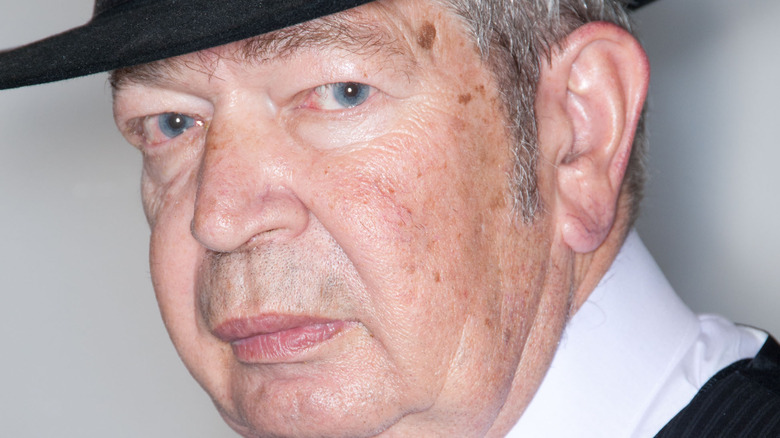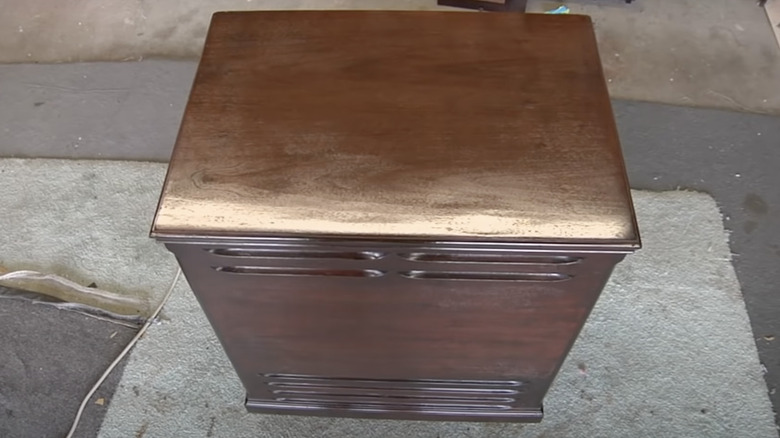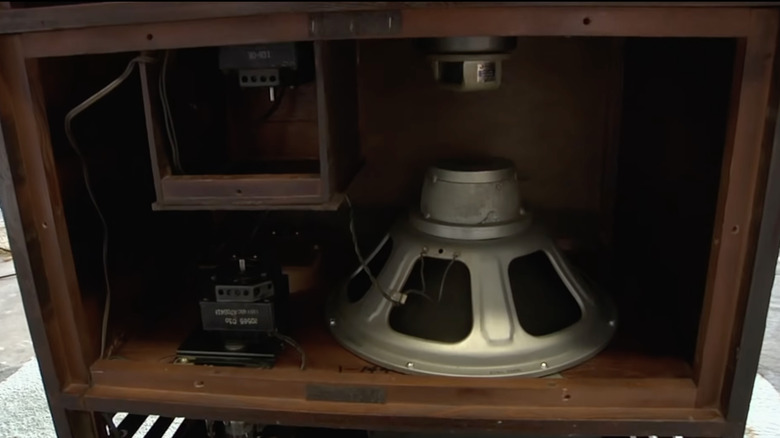The Antique Organ Speaker The Old Man Made A Deal For On Pawn Stars
Over the 18 seasons that History's "Pawn Stars" has been on air, the pawnbrokers of Gold and Silver Pawn Shop have purchased numerous musical instruments in hopes of hearing that sweet "cha-ching" of their cash register filling up with money from a profitable sale. In one Season 5 episode of the show, a seller named Jake wheels a Leslie Model 145 organ speaker into the shop for the Old Man to check out, and the seasoned pawn star is definitely excited by the well-loved machine (not that you could really tell from the permanent sour expression on his face).
Navy researcher Don Leslie began designing organ speakers in the early 1940s, and over the next few decades, they grew to be a popular choice for musicians, gospel and rock alike. This particular model was likely manufactured in the 1960s, so the seller hopes to get at least $500 for it. He tells the Old Man and Chumlee that he buys storage lockers — a process which, as seen on A&E's "Storage Wars," doesn't allow the buyer to inspect all of a locker's contents — and he just doesn't have the space for the big cabinet housing the speaker.
$500 may not seem like much compared to some of the extremely valuable antiques that have come through the doors of Gold and Silver Pawn Shop, but the late Richard "Old Man" Harrison didn't build his empire by spending more than necessary on even the smallest of purchases. This speaker doesn't have its power cord, so the seller can't say for sure if it works, and that makes this a risky buy. So, will the Old Man hand over five Benjamins for the Leslie speaker?
This speaker sounds a little too expensive to the Old Man
Before the Old Man and the seller, Jake, enter into negotiations for the 1960s Leslie Model 145 organ speaker, the pawnbroker tells the camera that "In working condition, these things can sell for over a thousand bucks," so he stands to make some good profit from it — as long as it works. As he can't verify that, he needs to work hard to lower Jake's price as much as possible.
Kicking off negotiations, Jake repeats that he wants $500 for the speaker, but the Old Man quickly counters with $200 because refurbishing it might cost more than it is worth. In fact, he's so cautious about the deal that when the seller tries to counter with $400, he tells him that he won't pay more than $200 for it. Left with few options and a space-hogging organ speaker, Jake takes the $200 to get rid of the thing.
Chumlee brings the Leslie Model 145 to a repairman to see if he can get it working. The repairman tells him that he varnished the surface by hand to make the wood shine and overhauled the interior of the cabinet — there had been mice living in the speaker, and their feces had damaged the mechanical pieces. He tells Chum that the original speaker is really rare and very high quality, even going so far as to say, "You can't buy a speaker that sounds that good anymore." After all this buildup, Chum can't wait to hear the speaker in action.
With the speaker refurbished, the only question left is its profitability
Now, it's time to put his work to the test: The repairman plugs a guitar into the speaker, telling Chum that the original speakers only worked for Hammond organs, but that he modified it to work for anything. The speaker works, and the guitar sounds great (Clearly, this repairman is also a musician). The best part of all is that for all the repairs, the musician/repairman only charges the shop $600, bringing the cost of the speaker up to a total of $800.
Having done the math, Chumlee is uncertain of the shop's ability to make a profit from this speaker, but the repairman reassures him that, once these speakers are modified to be compatible with a variety of instruments, they can easily go for $2,000. Rick Harrison and Chum can't wait to sell it, but the Old Man has other plans, at least momentarily: The scene ends with Rick walking into the storage room to find his father happily banging away at some keys, which are plugged into the speaker. He exclaims, "I think I got the hang of this thing!" over the dissonant tune.


